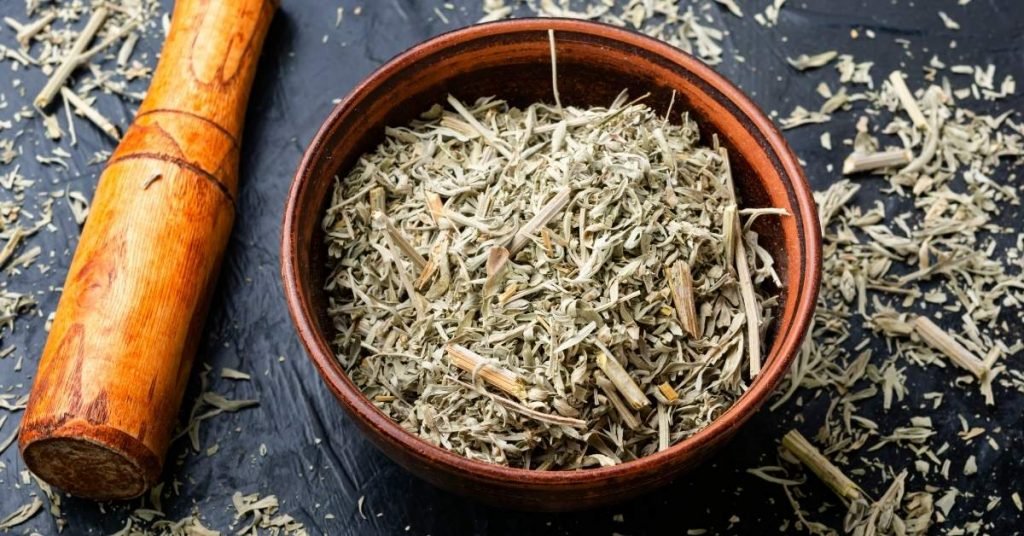Have you ever heard of wormwood? This is a herbaceous plant of the Artemisia family, which has great properties and health benefits.
It was used in the Middle Ages to cure various conditions and pathologies.

Wormwood is well known for its bitter taste which serves as a parasite repellent. It is found in dry and sunny soils, next to wastelands or roads. This plant has erect, whitish stems and leaves with silky hairs, soft to the touch, it also has yellow flowers.
Most Common Uses of Wormwood Tea
In ancient times, wormwood tea was used as a natural remedy to relieve the symptoms of certain health problems and today it is still attributed to excellent medicinal properties.
Wormwood has several uses, of which you can take advantage since they are beneficial for your body. The most common uses of wormwood are the following:
- It repels parasites, thanks to its bitterness, and relieves the discomfort of an insect bite. It also helps to expel parasitic worms from the body.
- It helps to improve digestive problems.
- It can also be used to prepare a wormwood tea that will help improve intestinal transit.
- It is used to treat malaria.
- It helps with fever.
- Stimulates sweating.
- Treats jaundice (yellow pigmentation of the skin and mucous membranes of the body due to a liver problem).
- Stimulates sexual desire.
- Promotes weight loss by stimulating metabolism.
- It fights halitosis (bad breath).
- It has diuretic properties and prevents liquid retention.
- To improve the symptoms of colds and flu.

As you can see, wormwood has several beneficial uses for your health.
Medicinal Properties of Wormwood and Its Benefits
There are several medicinal properties of wormwood and benefits for our bodies.
Among the active components of wormwood, we find thujone and cineole in its essential oil, present in almost all the plants, bitter substances such as absinthe, as well as other components such as phenolic acids, flavonoids, tannins, and some mineral salts.
- Carminative
- Expectorant
- Choleretic
- Anti-inflammatory
- Vermifuge
- Diuretic
- Healing
Due to its bitterness, it is very beneficial for problems of the digestive system such as flatulence and poor digestion, as it stimulates the production of the hormone gastrin, which helps to direct the food through the digestive tract.
It combats lack of appetite, as the bitter principles increase stomach movements. Thanks to this, this plant can be administered to people with anorexia, malnourished or weakened.
It has anti-inflammatory and diuretic properties, so it is used in the treatment of osteoarthritis and rheumatoid arthritis.
Being a diuretic, this plant is also used as a weight loss supplement. If you are interested in this property because you want to lose weight and cleanse the body, in this other article you will find What are the most diuretic infusions.

Thanks to its expectorant properties it helps to improve respiratory problems that involve mucus, such as colds and flu.
Wormwood tea can even be applied on a sore joint can relieve pain and reduce inflammation of for example a sprain, a dislocation, a tear, fractures, or tendonitis.
Wormwood has bactericidal and fungicidal properties, making it ideal for treating skin problems such as sores or wounds.
The emmenagogues contained in this plant promote menstrual blood discharges, so the tea can be used to treat certain menstrual abnormalities.
It serves as a tonic for your body, revitalizing and providing energy.
How to Take Wormwood?
The most common is to make an infusion of wormwood by adding 3 tablespoons of wormwood to a liter of boiling water and drinking two or three cups a day before or after any meal. If you can’t stand the strong taste you can add honey, sugar, or lemon to the infusion. Wormwood can be taken in 3 different formats:

- Infusion: prepare a liter of boiling water and add 7 grams of the flowering end of the plant and take two glasses a day as an aperitif.
- Powder: take a maximum of 3 grams a day as an aperitif.
- Tincture: it is obtained by adding 15 drops of this plant to an infusion of anise or mint. Ingest 3 times a day but outside of meals.
Here we explain how to take wormwood in certain situations:
- Wormwood for weight loss: wormwood can help you lose weight as long as you lead a healthy lifestyle, exercise, and eat a healthy diet low in fat. You can take two infusions a day of this plant. Here we tell you more about What are the best infusions for weight loss.
- Wormwood for menstruation: take an infusion of a teaspoon of dried plant per liter of boiling water and drink two cups a day 7 days before it comes.
- Wormwood for liver: if you have biliary problems you can take a small cup of an infusion of half a teaspoon of dried plant per cup of water. Do not add honey and drink it before breakfast. If on the other hand, you have jaundice ingest an infusion of a tablespoon and a half of dried leaves per liter of water and take it on an empty stomach.
- Wormwood for digestive problems: for any digestive problem you can ingest an infusion of half a tablespoon of leaves and flowers per cup of water.
- Wormwood for rheumatism problems: take an infusion of half a tablespoon of dried plant per cup of water for 10 to 15 minutes and drink three cups a day sweetened with honey.
- It is important not to overuse wormwood, as its abuse could produce harmful effects on your health. Take it in small doses no more than 3 times a day and for a maximum of 3 weeks in a row. It is best to take it always under the prescription of a doctor, who will indicate the doses according to the case.
Contraindications of Wormwood
It should be noted that, although this plant is very beneficial to health, there are also certain contraindications of wormwood as a medicinal plant:

- It is not recommended for pregnant or lactating women.
- Although it is not very common, it may be the case that you are allergic to this plant or any of its components, so in this case, you should not come into contact with it under any circumstances.
- Children under 8 years old.
If you’re looking for a special and unique flavor, check out our extraordinary selection of teas at Hummingbird Tearoom. Add any medicinal herb to one of our organic teas elaborated for your enjoyment and health.
MEDICAL DISCLAIMER
Itsnevernotteatime.com cannot and does not contain medical/health advice. The medical/health information is provided for general and educational purposes only and is not a substitute for professional advice.



